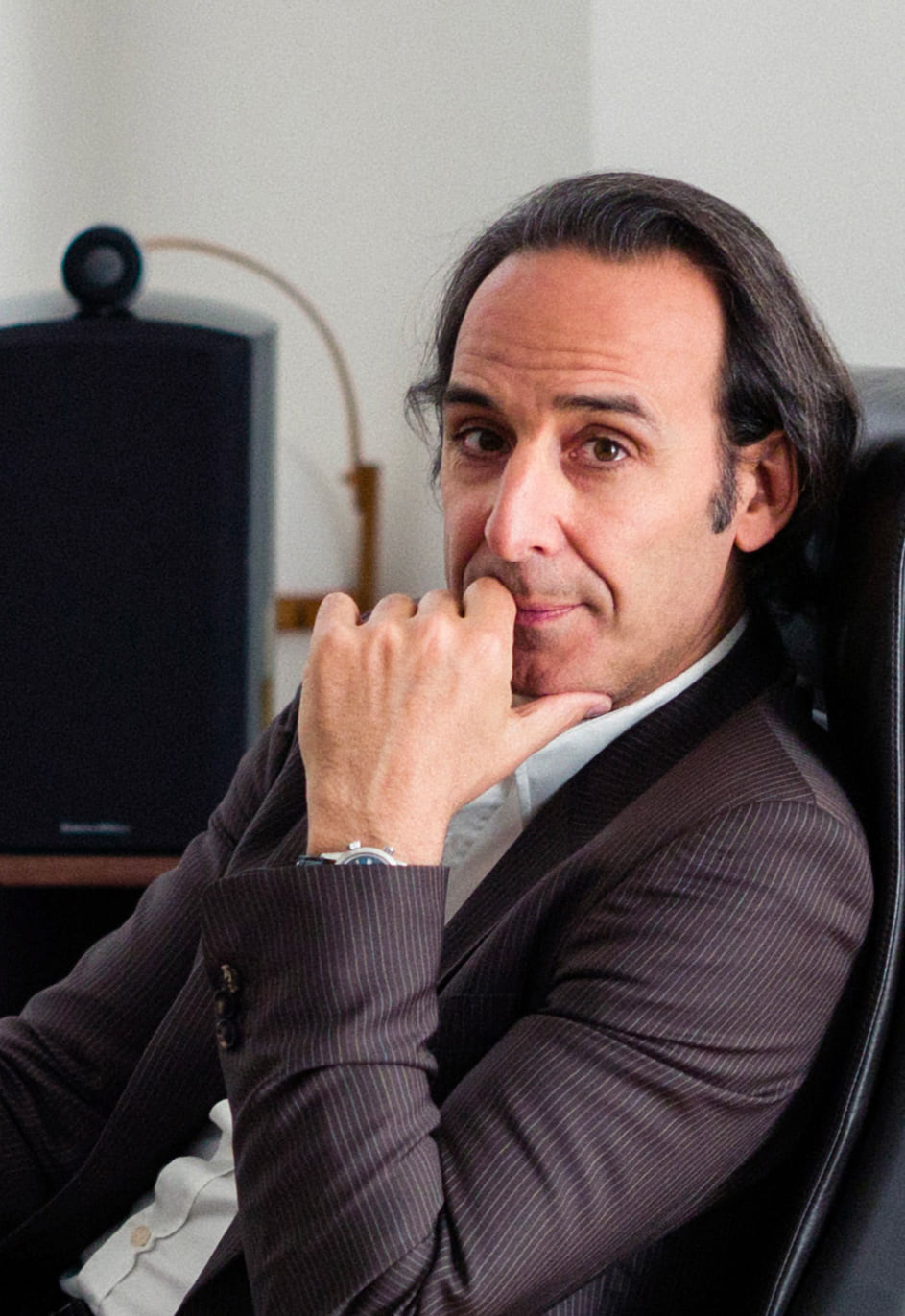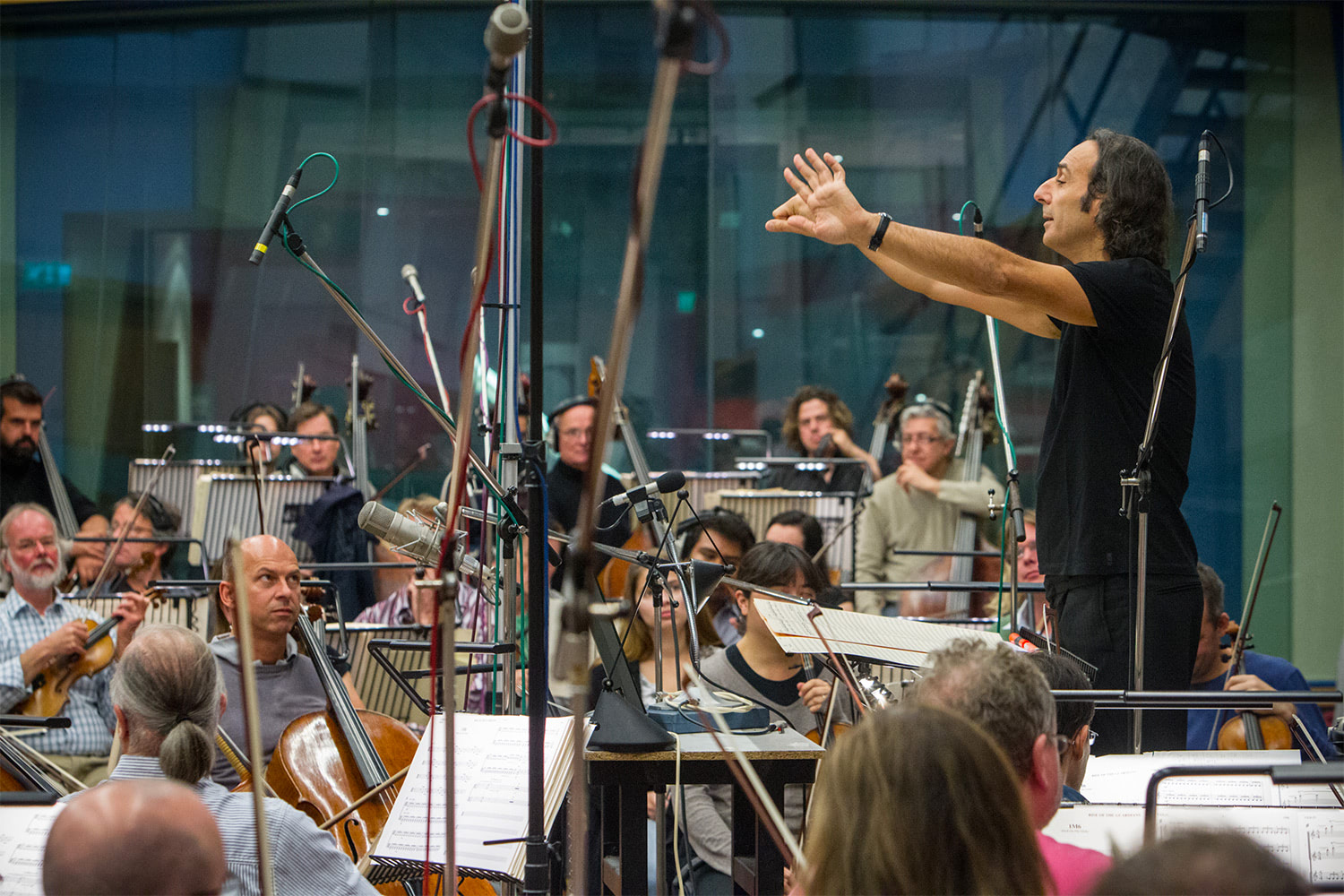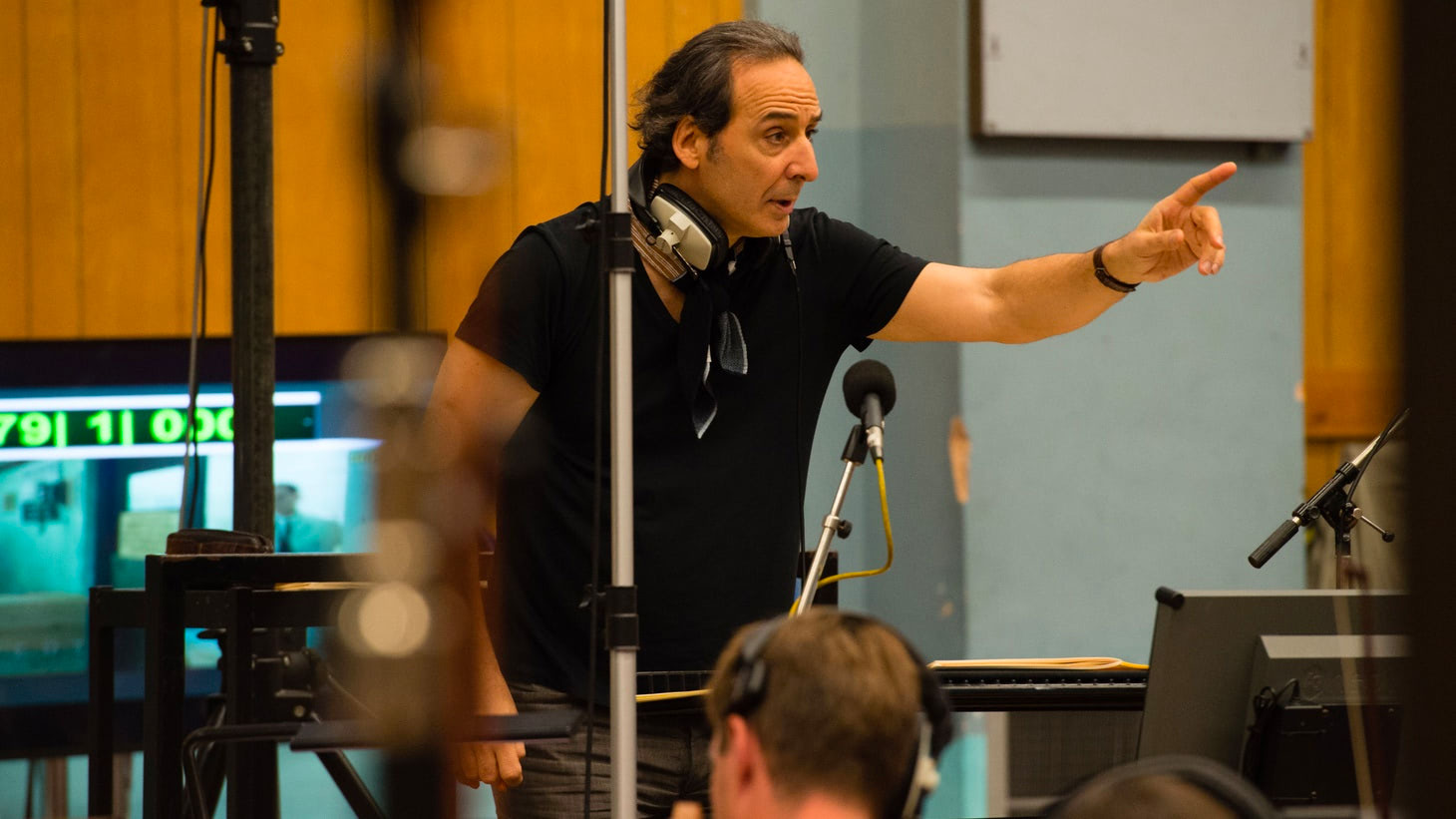We recently had the pleasure of participating in a group fan site interview with French composer Alexandre Desplat, composer of both Deathly Hallows film scores. Desplat brings immeasurable experience and talent to the Harry Potter franchise, following in the footsteps of composers John Williams, Patrick Doyle and Nicholas Hooper.

When you wrote the score for the film, did you find that your ideas came to you very quickly in short bursts, or did they take a long time to develop?
Alexandre Desplat: You know these films are such huge machines — there’s such a huge expectation and so much pressure from the past because its the biggest series of the last 10 years — that you have to be very careful and double-check, triple-check that every note you write is accurate and fine, and you want to challenge yourself to be, if not as good, to approach the talent of the master that John Williams is, so it requires a little bit of attention. You can’t write a score of that kind in a short amount of time so you need to really try things over and over again. Also on these big machines now, the editing keeps changing and you have to adapt to that, so you need that time to be able to write properly and accurately.
Did you compose the soundtrack for Part 2 as a follow up for Part 1 or did you treat them as separate projects?
When I first was asked to write Part 1, it was not yet signed that I would write Part 2, so, unfortunately, I could not write thinking of the two episodes at the same time. However, there are still some themes of Part 1 which continue in Part 2 like what I call the “Band of Brothers” theme when all the friends reunite at the beginning of Part 1. We hear this theme again in Part 2 and also some of the themes and motifs of “Obliviate,” the thing that opens Part 2, that comes back also in Part 2, so there is some continuity.
Did you get to see the first half of the final film with your score added to it, and how did you feel about seeing everything put together?
I saw Part 1 finished a long time again, and it was great. I think the essence of what it portrayed — the sense of loneliness and a loss of childhood — were very strong, and I think it was a great first part.
Since Deathly Hallows: Part 2 was filmed way before it normally would be, did you got more time to score the film, and if so, did that affect your scoring process at all?
I think I had a lot of time to write, a very comfortable amount of time to write, because all together writing it and composing took about three and a half to four months for each episode. When you’re filming on set, you can decide on shooting all the scenes that belong to this set and then you can still change them. It’s very different with the score. I had to wait until I saw Part 2 edited to be able to start putting ideas together and try to find a sense of an arc and a dramatic sense for the film. There was enough time, and it was hard work for many months but also still very inspiring.
There are quite a few deaths in this film. Which was the most difficult to write, for and were there any that hit you harder than the others?
Death is very present in the Harry Potter story from the beginning because it starts with an orphan who lost his parents, and, actually, the theme of death is very present in this episode, since Lily, Harry’s mother, is the lead character of this episode. We start the film with hearing Lily’s theme, which will kind of ghost the film all along and be the music thread that will take us from the beginning to the end of the film. So that’s one element of death, the people that you miss, the people that you long for, the sorrow, and the question about death and the resurrection stone and how you cope with the death of the people you love. That’s very present in the themes that are used and you see it when you see the film and hear the soundtrack that I’ve tried to be very sensitive and emotional on these matters. The other side of death is, of course, also the battles, the duels, the final battle between Harry and Voldemort, and they are both fighting for death, and there’s no mercy. So I wrote some epic and lyrical pieces for these battle moments.
Given the nature with the backstory of Lily Potter, what was your inspiration for creating Lily’s theme, and what kind of emotion did you hope to convey with that bit?
I think the goal was to find something as gentle, as sweet, and as kind as a lullaby with a guilty touch to it. It’s a very simple melody that anyone can hum, child or adult, and we found this incredible singer, Mai, who has a very pure voice, almost like liquid gold. So it will haunt the film and Harry all along the last episode.
Did you find it challenging to write for large battle scenes or was that something that was fun?
It is fun and challenging because there have been many movies with battles and action scenes in the past, so you have to find your own path and your own voice through that. It is a different approach than an intimate scene, but I like having a big orchestra rolling, and I’m going to say that in many places, we alternate from action cues to very lyrical memento, more operatic to counterbalance the action. It’s a real balance between emotion and action. Sometimes it’s good to feel the adrenaline of the battle, and sometimes it’s good to take it from a bird’s eye view and have more of a distant look to it. With this bird’s eye view, you can sometimes create a deeper emotion. We played a lot with balancing these moments with David Yates.

Will any references to the previous soundtracks and score be making an appearance in this final movie?
Well, we all know there’s one theme, which has become iconic — “Hedwig’s Theme” from John Williams. This theme is crucial to the success of the story, and it would have been disrespectful and stupid for me not to use it at the crucial moments where we need to refer to these ten years of friendships that we’ve all had with these characters and kids, so “Hedwig’s Theme” does reoccur a lot more in Part 1 where loss of innocence was the main theme of the film and where “Hedwig’s Theme” was referring to childhood and Hogwarts. Now we’re back in Hogwarts where the battle takes place, and all the friends are there so it made sense to have it there. Also, at the end of the film when we say goodbye to these three kids who are becoming adults and are looking towards a new life, the John William’s theme is present. It’s one of the most wonderful themes ever written for films, so it’s a delight to work with it.
Do you have a favorite piece from the upcoming film?
Yes, I think Lily’s theme, which opens the film, might be the one I like the most because it has the kindness and mysteriousness that we need to feel when the movie starts even though everything isn’t explained yet about how Lily influenced Harry and other characters’ destinies in the film, so its the theme that I think I like the most and cherish a lot.
What characteristic of Ron and his growth to the series and through Deathly Hallows inspired the orchestration of his theme?
Ron has difficulty showing his emotions because he’s a bit clumsy, shy and goofy at times, but I felt that the music should show that he has a big heart and great sensitivity. I think that’s what drove our choice in the melody and the type of orchestration that we used in his theme. It does come back in Part 2 — I use it again at one point when Hermione and Ron are reunited.
Which moment of the film was the most difficult to transcribe into music?
That’s a tough one. It’s a tough one because with this film being the final one, there are so many crucial moments that everyone has been waiting for throughout the course of ten years. Maybe one of the most difficult ones was the final battle between Voldemort and Harry because it’s a long moment of battle and dueling, and it was hard to find the rich balance between danger, action and to keep emotion in there without being too repetitive to previous duels. So I guess the final moment that brings Harry victory. I don’t think I’m giving it away.
Which Brazilian instruments were used, and in which tracks were they used in Part 2?
I always use Brazilian elements in my scores because I played a lot of Bossa Nova. I had a band in my teens where we were playing all the tunes by Vinicius (de Moraes), Tom Jobim, Gilberto (Gil) and Chico Buarque. I’ve always used rhythms or instruments that come from Brazil. I used some tamborin and pandeiro in Part 1, and I think I used them again in Part 2. They were interwoven with some other drums like snare drums and djembes, but I did use some of the typical Brazilian percussion instruments.
Out of the entire score, which was the piece you were most personally connected to?
I think the “Obliviate” cue of Part 1. It’s one of the themes I’d be able to listen to again, while usually I don’t listen to my music. I can’t stand hearing it, and I tend to think it sucks! So, I think the “Obliviate” cue is a cue that I would be happy to hear again, and, as I said before, the Lily theme in its opening title form would be okay for me to hear again. The rest I’m very cautious about, and I try to be very distant from my work and keep it in a computer or iPod that I don’t listen to for years because I get very frustrated, and I feel like everything is wrong.
How is director David Yates involved in the process of making the score?
David is very involved. I would see him in my office every day in London, and I would play him my themes and demos. I write electronic demos, which are very, very precise that sound like the final product and just need an orchestra to sound really good. You can really tell against the picture which part goes where, and the director can really react to it, so we spent a lot of time tweaking things at the studio. Then, we spent a lot of time when recording with the orchestra tweaking again, trying to focus and make it more accurate. So, yes, David is very involved in every aspect of his film: the special effects, the sound, and the music.
Were you a fan of the series before you were asked to score the films?
Yes, of course. One of my daughters has been a big fan since she was a kid. I followed all the films and read the books because I had to be able to have a connection to her passion for Harry Potter. If I didn’t read the books, I would have been a bad dad! So I had to go through that, and it was a pleasure because these books are very smartly and creatively written. I think J.K. Rowling is a genius writer, and of course I saw all the films, and, mainly, above everything, since I was a John Williams fan for many years, I would always buy the scores from the beginning. When they came out, I would jump on it, so I’ve always been a big Harry Potter fan.

How hard was it coming into this project, when it was essentially handed down from Williams and Doyle?
Well, when you come after such a genius composer as John Williams and when you have to use his themes, you have to be respectful and challenge yourself and try to find good ideas. When the theme is good, it’s easy. If “Hedwig’s Theme” was bad theme, it would have been painful, but it’s such a genius theme that it was just a matter of time and inspiration. It was really fabulous to work around his theme.
When you’re first seeing the film and figuring out what to compose, do you base that on the substance of the scene or how the scene is shot and looks like on the screen?
Writing the music for a film is a global experience. You have to feel the overall flow of the film and the overall emotion of the film in order to deliver something that is connected to every sequence. I like to write horizontally more than vertically, which means I prefer to think about the overall rather than sequence by sequence. I think when you work sequence by sequence, you lose the thread, the continuity. I always try to have a concept of what the score will be overall.
Conrad Pope was the first person to reveal when the score had been finished with you and the London Symphony. He’s been working on these for a very long time. Was it kind of an emotional moment in the studio when everything was said and done? What was it like when it was all finished?
Conrad is certainly, of all of us, the most involved of the music team. He was the one who was involved from the beginning. I was more relieved that it was the end of the job because it was a very hard job, and I was happy to know that very soon I’d be on holiday. Conrad Pope is a genius, he knows everything about music–everything you can think of he knows it–he’s worked with John Williams a lot. But he knows music from the past, contemporary music, jazz — he knows everything. He knows it all and working close to such a great musician was really fabulous for me, really beautiful, because I learned a lot everyday working on the orchestrations with him to create sounds that belong only to the very scores that we were creating. Conrad is a fabulous musician.
Did you find more inspiration from the original book or watching aspects of the film productions?
I chose to be a film composer because I like to watch. I’m inspired by the visual, so I guess I could certainly write music from reading a book but what really turns me on are the images.
Where did you begin in the score writing process when you first got the job on these films?
On Part 1, I had such a big task in front of me because it was my first Harry Potter score, and I was under a lot of pressure trying to take over the many years of composers working on the series. I didn’t know David Yates, and it was a bit of a challenge. With Part 2, I knew the team already, so the challenge came with it being the final episode. So there were two different kinds of heavyweight tasks to deal with. On Part 1, it was to find a tone that would still have an echo of the past scores, especially the John Williams scores, which I think you understand that I cherish, and still have my own voice. And on Part 2, it was to find this balance between emotion and epic drama that we need to build together. And also again, keeping my musical integrity and having everyone hear my music and say, “Oh, yes, it’s Desplat, not John Williams.”
What was the first piece of music you wrote for the film and how did the rest follow from that?
I think the first piece I wrote was Lily’s theme. I played it on the piano for the producers, and then for weeks, I tweaked it and improved it. They loved it, and we came up with this beautiful idea of this voice as the thread. That’s the theme that started everything.
Will we hear any themes inspired by Patrick Doyle or Nicholas Hooper?
I don’t think you’ll hear a theme from Patrick Doyle. With, Nicholas Hooper, you might, but that’s a surprise.
***
The Deathly Hallows: Part 2 soundtrack will be released on 12 July.